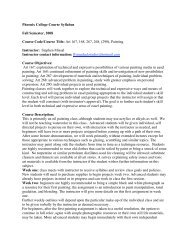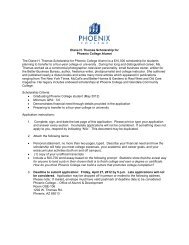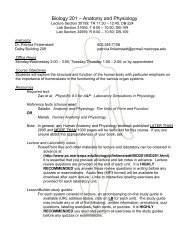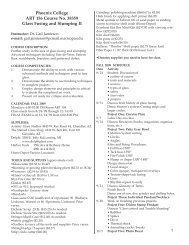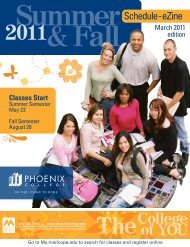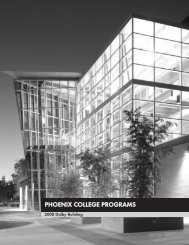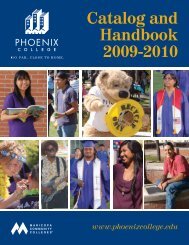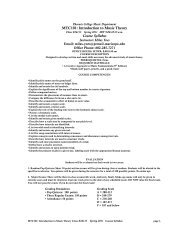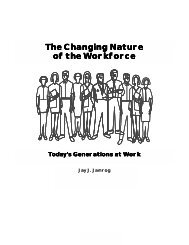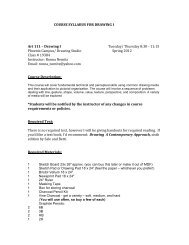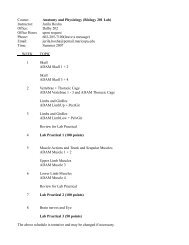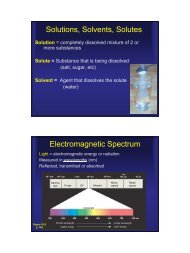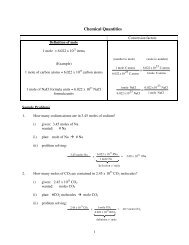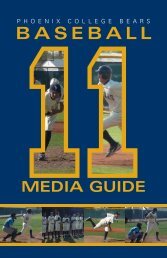#12 06 Courses #1 - Multiple Choices
#12 06 Courses #1 - Multiple Choices
#12 06 Courses #1 - Multiple Choices
Create successful ePaper yourself
Turn your PDF publications into a flip-book with our unique Google optimized e-Paper software.
Course Descriptions<br />
258 • Phoenix College 2005-20<strong>06</strong> Catalog<br />
EDU241<br />
Methods for Teaching the Bilingual<br />
Student<br />
3 credits 3 periods lecture<br />
Methods of developing lesson plans in<br />
the content areas. Emphasis on<br />
components of bilingual curriculum<br />
content, teaching techniques,<br />
development and evaluation of teaching<br />
materials. Prerequisites: (SPA103 or<br />
SPA104) and (EDU225 and proficiency in<br />
Spanish), or permission of instructor.<br />
Course Notes: Requires fifteen (15) hours<br />
of field experience in an elementary or<br />
secondary classroom environment.<br />
EDU245<br />
Internship in Bilingual/ESL Education<br />
3 credits 3 periods lecture<br />
Provides an opportunity for future<br />
teachers and teacher aides to receive<br />
supervised, practical, on-site experience<br />
in a K-12 bilingual or ESL (English as a<br />
Second Language) classroom under the<br />
direction of professional teachers.<br />
Prerequisites: (EDU225 and EDU230<br />
and ENG213) and (EDU210 or EDU211),<br />
or permission of instructor.<br />
EDU270<br />
Learning and the Brain<br />
3 credits 3 periods lecture<br />
Teaching and learning issues within a<br />
cognitive processes context. Covers<br />
emotion, memory, and recall as well as<br />
early brain development and its<br />
relationship to learning. Emphasis on<br />
current neuroscientific brain research<br />
and how it impacts teaching practice in<br />
preK-12 classrooms. Prerequisites:<br />
None.<br />
EDU282AA-AC<br />
Volunteerism for Education: A Service<br />
Learning Experience<br />
1-3 credits 1-3 periods lab<br />
Service-learning field experience within<br />
educational systems, citizen advocacy<br />
groups, and human service<br />
organizations/agency. May be repeated<br />
for a total of six (6) EDU282 credit hours;<br />
may not repeat specific agency<br />
assignment for more than three (3) credit<br />
hours. Standard grading available<br />
according to procedures outlined in<br />
catalog. Prerequisites: Permission of<br />
instructor.<br />
EDU/ENH291<br />
Children’s Literature<br />
3 credits 3 periods lecture<br />
Review of folk and modern literature<br />
from a variety of world cultures,<br />
including application of literary criteria<br />
to folk and modern literature for<br />
children. Prerequisites: None.<br />
EDU/HUM/STO292<br />
The Art of Storytelling<br />
3 credits 3 periods lecture<br />
Explore the art and origin of storytelling.<br />
Provide a variety of storytelling<br />
techniques, styles and exercises to<br />
enhance the delivery of telling stories.<br />
Assist in the integration and application<br />
of storytelling to the learning<br />
environment in the classroom.<br />
Prerequisites: None.<br />
EDU296WC<br />
Cooperative Education<br />
3 credits 15 periods lab<br />
Work-college experiences that involve<br />
the combined efforts of educators and<br />
employers to accomplish an outcome<br />
related to the career objectives of the<br />
students. Prerequisites: Completion of<br />
at least twelve (12) college credits,<br />
minimum 2.6 grade point average, and<br />
be able to obtain a position related to<br />
student's academic or career goals<br />
(student's present job may qualify); or<br />
permission of instructor. Corequisites:<br />
Must be concurrently enrolled in at least<br />
one class which is related to student's<br />
major or career interest or with<br />
permission of the instructor.<br />
EDU298AA-AC<br />
Special Projects<br />
1-3 credits 1-3 periods lab<br />
Organized and tailored around the<br />
interests and needs of the individual<br />
student. Structured to provide an<br />
atmosphere of individualized research<br />
and study paralleled by professional<br />
expertise and guidance. Professionaltype<br />
facilities and equipment are made<br />
available for student use. Allows the best<br />
aspects of independent study and<br />
individualized learning to be combined<br />
to maximize student development.<br />
Prerequisites: None.<br />
EMT – Emergency Medical<br />
Technology<br />
EMT/HLR101<br />
Cardiopulmonary Resuscitation/Basic<br />
Cardiac Life Support<br />
0.5 credit 0.5 period lecture<br />
Designed to train students in the skills of<br />
cardiopulmonary resuscitation to include<br />
mouth-to-mouth, mouth-to-mask, and<br />
cardiac compression, stabilization of<br />
adult, infant, and child victims with<br />
airway obstruction, respiratory, and<br />
cardiac arrest. Prerequisites: None.<br />
EMT/FSC104<br />
Basic Emergency Medical Technology<br />
8 credits 9.45 periods lecture + lab<br />
Techniques of emergency medical care in<br />
accordance with national and state<br />
curriculum. Study of the human body,<br />
patient assessment, treatment of<br />
medically or traumatically compromised<br />
patients, special hazards, and medical<br />
operations. IV monitoring, Sudden<br />
Infant Death Syndrome (SIDS), patientassisted<br />
medication administration,<br />
automated external defibrillators, and<br />
blood-glucose monitoring. Includes<br />
participation in two eight-hour clinical<br />
rotations through a local emergency<br />
department scheduled during the<br />
semester outside normal class hours.<br />
Requires personal pocket mask,<br />
stethoscope, pen light, and trauma<br />
scissors. Prerequisites: Must be at least<br />
18 years of age prior to applying to the<br />
BLS (Basic Life Support) Training<br />
Program per Arizona Revised Statutes,<br />
and must have a current Cardio<br />
Pulmonary Resuscitation certification<br />
from the American Heart Association,<br />
American Red Cross, or other equivalent<br />
organization at the Healthcare Provider<br />
Level, meeting the new Guidelines 2002.<br />
Minimum ninth grade level reading<br />
proficiency on the Nelson-Denney<br />
Examination or equivalent. Proof of TB<br />
testing or chest x-ray with a negative<br />
result within 6 months prior to<br />
application; immunity to rubella<br />
(German measles) and rubeola.



